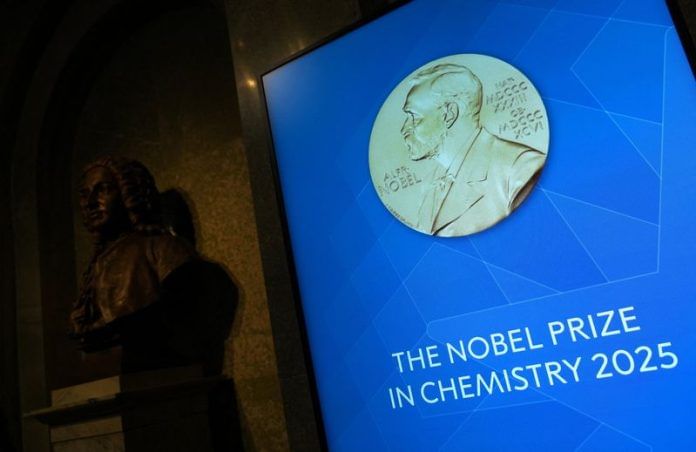STOCKHOLM (Reuters) -Scientists Susumu Kitagawa, Richard Robson and Omar Yaghi won the 2025 Nobel Prize in Chemistry “for the development of metal–organic frameworks”, the award-giving body said on Wednesday.
The more than a century-old prize is awarded by the Royal Swedish Academy of Sciences and the winners share 11 million Swedish crowns ($1.2 million), as well as the fame of winning arguably the world’s most prestigious science award.
“They have found ways to create materials, entirely novel materials, with large cavities on their inside which can be seen almost like rooms in a hotel, so that guest molecules can enter and also exit again from the same material,” Heiner Linke, Chairman of the Nobel Committee for Chemistry, told a press conference.
“A small amount of such material can be almost like Hermione’s handbag in Harry Potter. It can store huge amounts of gas in a tiny volume.”
The three laureates worked to create molecular constructions with large spaces through which gases and other chemicals can flow and that can be utilised to harvest water from desert air, capture carbon dioxide and store toxic gases.
Kitagawa is a professor at Kyoto University in Japan while Robson is a professor at the University of Melbourne, Australia, and Yaghi is a professor at the University of California, Berkeley, in the United States.
“Through the development of metal-organic frameworks, the laureates have provided chemists with new opportunities for solving some of the challenges we face,” the award-giving body said in a statement.
The Chemistry Nobel was the third prize announced in this year’s crop of awards, in keeping with tradition, following those for medicine and physics announced earlier this week.
Established in the will of Swedish inventor and businessman Alfred Nobel, the prizes for achievements in science, literature and peace have been awarded since 1901, with a few interruptions mostly due to the world wars.
Nobel was himself a chemist and his developments in that field helped underpin the wealth he amassed from his invention of dynamite in the 19th century. The economics prize is a later addition funded by the Swedish central bank.
Sometimes overshadowed by more famous laureates in the fields of physics, literature and peace, the chemistry awards have still recognised many influential discoveries such as nuclear fission, DNA sequencing techniques, and yeast.Last year’s chemistry award went to U.S. scientists David Baker and John Jumper and Briton Demis Hassabis for work on decoding the structure of proteins and creating new ones, yielding advances in areas such as drug development.
($1 = 9.3436 Swedish crowns)
(Reporting by Niklas Pollard, Simon Johnson and Johan Ahlander in Stockholm; additional reporting by Terje Solsvik in Oslo, Greta Rosen Fondahn and Marie Mannes in Stockholm; Editing by Alex Richardson)
Disclaimer: This report is auto generated from the Reuters news service. ThePrint holds no responsibility for its content.





